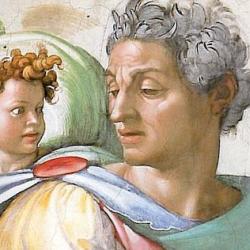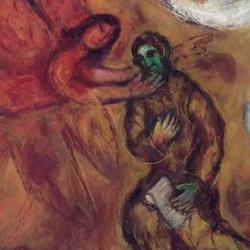King Ahaz of Judah is in a panic. Israel and Aram have allied to resist Assyria’s expansion, and they are pressuring Ahaz to join the alliance. If he refuses, they will overthrow Judah and replace him with another king. The result may be the end of the Davidic line.
Isaiah assures Ahaz that he doesn’t have to worry about Israel and Aram (Isaiah 7). The Lord will take care of them, and, besides, Assyria poses a greater danger.
But that’s not the heart of the prophet’s message. Like Ahaz, Isaiah knows that the house of David is threatened. He knows that the land of Judah is afflicted. But the threat doesn’t come from Aram and Israel, and it doesn’t fundamentally come from Assyria either. The main threat to the house of David is the king who sits on David’s throne. The one who is really afflicting the land is not Aram or Israel or Assyria, but Ahaz, the Davidic king (7:16).
Ahaz’s is not a political failure. It’s not that he hasn’t played the political game cleverly enough. His failure is a failure of faith.
Isaiah 7:9 has been called one of the main statements about faith in the Old Testament. Yahweh threatens to shatter Ephraim so that she is no longer a people, within 65 years. And that is a warning to Ahaz. If he does not believe, does not trust, his kingdom too will not fall.
The connection between faith and the stability of the kingdom is clearer in Hebrew, where the same root verb is behind the verbs “believe” and “be established.” Ungrammatically: If you do not have faith, you will not be faithed. If you do not trust, you will not have a trustworthy foundation. If you are not sure of Yahweh, you will not be assured. If you don’t stand in faith, you won’t stand at all (NIV). Faith is the only way to be well-founded.
Verse 9 alludes to the promises to David, using the verb that Yahweh uses when He swears to “establish your seed forever.” Now, even under threat from Aram, Israel, and Assyria, the Davidic line is well-founded because it is founded on the promise of God.
Clearly, faith is not mere assent to a creed or a doctrinal formula. Faith is not a Panglossian assurance that everything is going to turn out OK in the end. Faith is not hope in our power to put things right. Faith is not hope that present trends will continue.
Faith is confidence in the midst of crisis, but confidence pointed in a particular direction. Faith is trust in King Yahweh when it looks as if King Yahweh has checked out. Faith is a political virtue. Faith means renouncing political alliances and entrusting the fate of the nation to Yahweh and His promise. Faith is the opposite of fear.
According to Isaiah, the main threat to Judah is not Aram and Israel, or even Assyria. The threat is the faithlessness of her king. If Ahaz wants to see those promises to David realized, he has to trust Yahweh, trust Him and give up fear, trust Him and do nothing, trust Him and get out of the way to see what Yahweh will do.
If, on the other hand, he acts in panic and fear; if he tries to cut deals and jockey and play the power game, if he tries to manipulate and control and fix and spin – then Judah is genuinely in danger, because the the house of David has turned from King Yahweh to another way, turned from the faith that founds the dynasty to another god. If the kingfails to trust Yahweh, the house of David is truly doomed, because the house of David will have fallen into apostasy. It will be standing where there is no place to stand.










